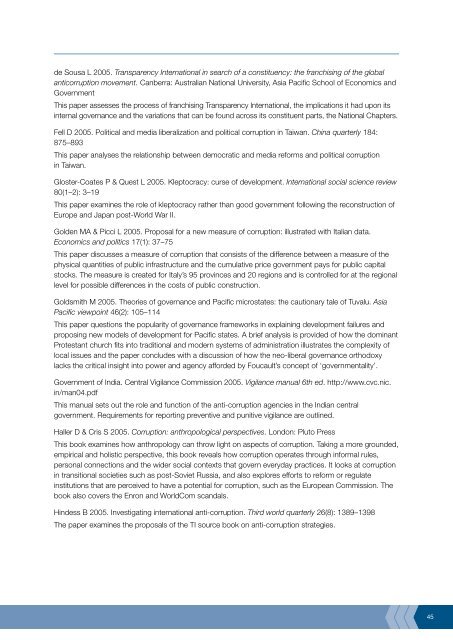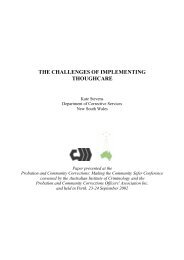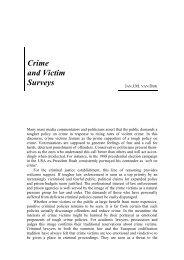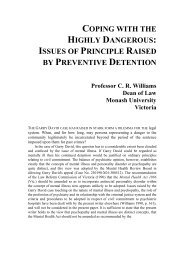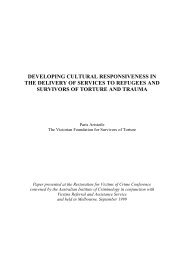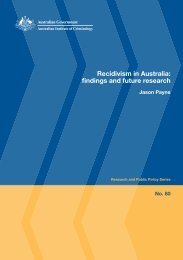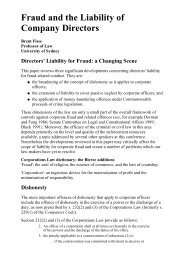Review of anti-corruption strategies Rob McCusker - Australian ...
Review of anti-corruption strategies Rob McCusker - Australian ...
Review of anti-corruption strategies Rob McCusker - Australian ...
You also want an ePaper? Increase the reach of your titles
YUMPU automatically turns print PDFs into web optimized ePapers that Google loves.
de Sousa L 2005. Transparency International in search <strong>of</strong> a constituency: the franchising <strong>of</strong> the global<br />
<strong>anti</strong><strong>corruption</strong> movement. Canberra: <strong>Australian</strong> National University, Asia Pacific School <strong>of</strong> Economics and<br />
Government<br />
This paper assesses the process <strong>of</strong> franchising Transparency International, the implications it had upon its<br />
internal governance and the variations that can be found across its constituent parts, the National Chapters.<br />
Fell D 2005. Political and media liberalization and political <strong>corruption</strong> in Taiwan. China quarterly 184:<br />
875–893<br />
This paper analyses the relationship between democratic and media reforms and political <strong>corruption</strong><br />
in Taiwan.<br />
Gloster-Coates P & Quest L 2005. Kleptocracy: curse <strong>of</strong> development. International social science review<br />
80(1–2): 3–19<br />
This paper examines the role <strong>of</strong> kleptocracy rather than good government following the reconstruction <strong>of</strong><br />
Europe and Japan post-World War II.<br />
Golden MA & Picci L 2005. Proposal for a new measure <strong>of</strong> <strong>corruption</strong>: illustrated with Italian data.<br />
Economics and politics 17(1): 37–75<br />
This paper discusses a measure <strong>of</strong> <strong>corruption</strong> that consists <strong>of</strong> the difference between a measure <strong>of</strong> the<br />
physical qu<strong>anti</strong>ties <strong>of</strong> public infrastructure and the cumulative price government pays for public capital<br />
stocks. The measure is created for Italy’s 95 provinces and 20 regions and is controlled for at the regional<br />
level for possible differences in the costs <strong>of</strong> public construction.<br />
Goldsmith M 2005. Theories <strong>of</strong> governance and Pacific microstates: the cautionary tale <strong>of</strong> Tuvalu. Asia<br />
Pacific viewpoint 46(2): 105–114<br />
This paper questions the popularity <strong>of</strong> governance frameworks in explaining development failures and<br />
proposing new models <strong>of</strong> development for Pacific states. A brief analysis is provided <strong>of</strong> how the dominant<br />
Protestant church fits into traditional and modern systems <strong>of</strong> administration illustrates the complexity <strong>of</strong><br />
local issues and the paper concludes with a discussion <strong>of</strong> how the neo-liberal governance orthodoxy<br />
lacks the critical insight into power and agency afforded by Foucault’s concept <strong>of</strong> ‘governmentality’.<br />
Government <strong>of</strong> India. Central Vigilance Commission 2005. Vigilance manual 6th ed. http://www.cvc.nic.<br />
in/man04.pdf<br />
This manual sets out the role and function <strong>of</strong> the <strong>anti</strong>-<strong>corruption</strong> agencies in the Indian central<br />
government. Requirements for reporting preventive and punitive vigilance are outlined.<br />
Haller D & Cris S 2005. Corruption: anthropological perspectives. London: Pluto Press<br />
This book examines how anthropology can throw light on aspects <strong>of</strong> <strong>corruption</strong>. Taking a more grounded,<br />
empirical and holistic perspective, this book reveals how <strong>corruption</strong> operates through informal rules,<br />
personal connections and the wider social contexts that govern everyday practices. It looks at <strong>corruption</strong><br />
in transitional societies such as post-Soviet Russia, and also explores efforts to reform or regulate<br />
institutions that are perceived to have a potential for <strong>corruption</strong>, such as the European Commission. The<br />
book also covers the Enron and WorldCom scandals.<br />
Hindess B 2005. Investigating international <strong>anti</strong>-<strong>corruption</strong>. Third world quarterly 26(8): 1389–1398<br />
The paper examines the proposals <strong>of</strong> the TI source book on <strong>anti</strong>-<strong>corruption</strong> <strong>strategies</strong>.


